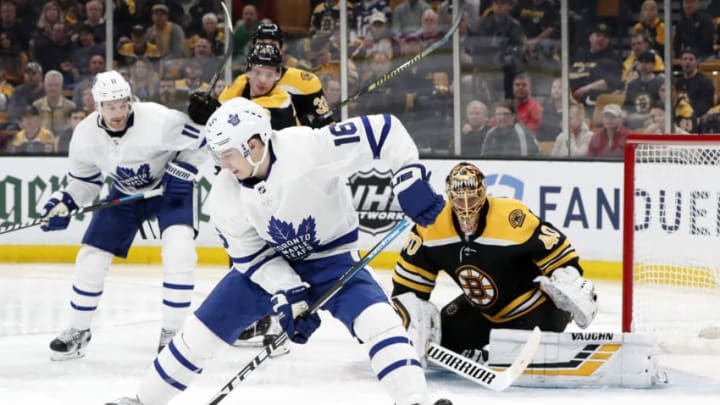The Toronto Maple Leafs still have not signed star forward Mitch Marner to a contract extension.
This begs the question: Should the worst case scenario arise, could the Toronto Maple Leafs win a Mitch Marner trade?
Highly unlikely.
In the NHL, with very few exceptions, it has never worked out when a team has been forced to trade a young superstar.
Phil Kessel worked out well for the Bruins – but only because they got extremely lucky with the draft picks.
Whether we’re talking Taylor Hall, Tyler Seguin or Filip Forsberg, there are precious few examples of a team trading a young elite-scoring forward and getting back a good return.
Trading Mitch Marner
If the Toronto Maple Leafs do have to trade Mitch Marner, one thing is clear: accepting a package of four first round picks isn’t as good as it seems.
The modern NHL Entry Draft begins in 1980 after the NHL absorbed the WHL and changed the drafting rules. Between 1980 and the Year they picked Mitch Marner, the Toronto Maple Leafs drafted 32 players in the first round – none of them as good as Marner.
Keep that in mind, and consider that in the NHL, elite players are basically all the matters, so if you had four picks it would be better to get one superstar and three duds, rather than four good players.
Therefore Marner for four draft picks is bad deal because you have extremely low odds of getting someone as good as Marner, and replicating him is the ONLY way win such a trade. It’s possible to win such a trade, but the odds are low.
You could flip the draft picks, but unless someone would give you a Mitch Marner-esque player who is still on his entry-level contract, you’re just back where you started (i.e having to pay an unsigned star player).
In fact, this is part of the problem – you have to pay anyone that you get, meaning that unless you’re willing to meet Marner’s demands in the first place (in which case why trade him?) you’re either going to pay a worse player less money or an equivalent player equivalent money.
A package deal is an automatic loss – two pretty good players whose combined salary is less than Marner’s might sound good by traditional standards. We know now, however, thanks to the analytics revolution, that a team is better off with the elite player.
Therefore there are only two ways that the Toronto Maple Leafs can win a trade for Mitch Marner:
- Trade him for Futures (or take the compensation) and get lucky. This is the Phil Kessel trade, and whether it’s picks or prospects, the risk is large that it doesn’t work out. Additionally, for a competing team hoping to win this year, it’s pretty stupid to play for the future.
- Acquire a player who can be potentially elite and play on the Leafs today on an entry-level contract.
So the only real way in which the Toronto Maple Leafs could trade Mitch Marner and come out on top is if they were to get a player like Rasmus Dahlin, Jack Hughes, Elias Peterson or Kaapo Kakko.
If they can pull that off, go for it. I mean a team would be absolutely nuts to make a trade like that, but I guess anything is possible. But otherwise whatever the package – a Mitch Marner trade is a near certainty to be be a loser.
